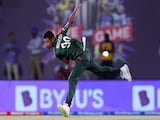The military planners in China organised a menacing simulation in which they blew up USS Gerald R Ford, the world's largest aircraft carrier. The simulation was run on the war game software used by China's military, according to a report in South China Morning Post (SCMP). The results were made public in a May paper published by the Chinese-language Journal of Test and Management Technology, the outlet further said. They imagined a scenario where the US vessels were attacked after they continued to approach an island claimed by China in the disputed South China Sea despite several warnings.
The US carrier fleet was sunk after 20 intense battles in the simulation in which 24 hypersonic anti-ship missiles were used, as per the SCMP report.
The researchers said that some of the missiles were fired from as far away as the Gobi desert and that nearly every US vessel was shattered and eventually sank.
This is the first time the results of simulated hypersonic strikes against a US carrier group have been made public. The team that carried out the simulation was led by Cao Hongsong from the North University of China.
The Chinese researchers said the war game simulation proves that the US carrier group, so far considered unsinkable by conventional weapons, can be "destroyed with certainty" by a relatively small number of hypersonic missiles, according to SCMP.
However, researchers have cast doubt on the real-world performance of these missiles and also questioned the motivation of the release of these documents.
"Anyone who discusses publicly the outcome of a war game or simulation has a political objective, especially if they frame the result as a win or a loss," Drew Thompson, a former senior US defence official, told the Telegraph.
"Effective war games are ones that test an assumption, a function, or variable to inform the sponsor of the game about the complex interaction of elements," he added.
Blake Herzinger, an Indo-Pacific expert and defence research fellow at the United States Studies Centre, said such assertions "are wildly off base".
"Even with today's more advanced weapons it is no easy task to sink a 100,000 ton warship," he told the outlet.















